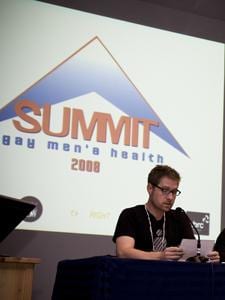The fourth annual Gay Men’s Health Summit took place in Vancouver at UBC Robson Square Oct 30-31. The focus of the summit, organized by the Community Based Research Centre (CBRC), in partnership with the Health Initiative for Men (HIM) and the BC Centre for Disease Control (BCCDC), was to develop strategies to integrate public health with community-level activism.
“The general objective is to get people working in some aspect of gay men’s health together on an annual basis to discuss what are the current issues, where we are going with this, and to try and strategize around what are the next steps we can take,” explains Rick Marchand of the CBRC.
“We’re trying to be very concrete and deal with real issues and move them along.”
The event attracted health care professionals and volunteers from across BC, Edmonton, Seattle and Montreal. The recurring themes that surfaced over the course of the summit were a lack of support from the public education system; the need for open dialogue; and methods for using the internet to interact with the community.
The summit made a strong case for BC’s Safe Schools Act to be re-examined and demanded legislation that would specifically protect youth from homophobia in schools.
“Canadian schools are still teaching children to hate homosexuals and homosexuals to hate themselves,” said Bill Ryan of Rezo, Montreal. A survey conducted by Rezo revealed that 30 percent of college-aged students in Quebec were subjected to homophobia whether they were gay or straight.
“The Canadian school system is not open to creative ways to discuss sexual education with a teacher in the room,” added Stephanie Grant, executive director of YouthCo, during a round table on gay sex culture. The discussion also highlighted the need for inspirational gay stories.
Presenters also addressed the need for more open, effective and sensitive dialogue from health care professionals around HIV. During his presentation on acute HIV infection, Olivier Ferlatte of BCCDC said it’s important that newly infected persons with HIV understand the likelihood of transmission is 11-49 percent during the first eight weeks after sero-conversion, while still being sympathetic to feelings of marginalization that accompany an HIV diagnosis.
Another topic of debate was the positive and negative effects of the internet on community building and how to harness it effectively.
According to some participants, YouTube is the most accessible means of engaging the community these days with online programming such as Vick Vancouver and Gay City TV. The advantage of these YouTube channels, they say, is that they create a two-way dialogue between the health and gay communities while engaging the arts community to become more involved.
Perry Kendall, provincial health commissioner and ally to the gay community, said the specific health risks gay men face aside from HIV and other sexually transmitted infections are mental health issues, depression, and substance abuse. HIV-positive men are also at high risk for anal cancer due the prevalence of Pamplona virus and an increase of syphilis transmissions, a negative side effect to sero-sorting as a result of barebacking.
In his closing remarks, Martin Blais of the University of Quebec in Montreal, said the summit demonstrated that for public/community health partnerships to be effective, programs will require multiple venues and messages, as well as the understanding that everyone is at risk in some way. Talking to gay men is not enough, he said, citing the importance of specific interventions.
The summit concluded with the official launch of the new Health Initiative for Men, which executive director Phillip Banks described as a “work in progress” whose success will be measured in participation by the community.
HIM has the full support BCCDC and is funded in part by Vancouver Coastal Health, AIDS Vancouver and private donations.
MP Hedy Fry said her party would push for more funding for gay men’s health but expressed skepticism under the current Conservative government. “It’s important for this to become a federal initiative, it is important for this to go across the country,” she said.
“When looking at the issues of health prevention and health promotion, it is key to look at the culture, age range, and to look at all of the other factors of the life cycle of a gay man’s life, including when he is still in the closet,” she added.

 Why you can trust Xtra
Why you can trust Xtra


